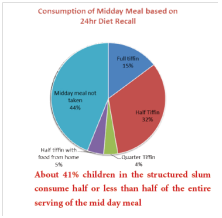Adithi Muralidhar
In India, the Mid Day Meal Scheme is a massive programme run by the Government of India to improve the nutritional status of school-age children all over the country. The scheme basically involves supplying lunch, free of cost, to school children during school hours on all working days. Currently the scheme covers 10.68 crore students across over 12.12 lakh schools all over India! (See official website here).
In Maharashtra, the scheme has covered around 81,119 primary schools and 39,233 upper primary schools reaching out to about 1.8 crore school-going children. One of the most important purposes being served by this is that it ensures children don’t drop out from school owing to financial restrictions. One meal a day guarantees their presence in school as parents are sure that their children do not face hunger, due to their economic difficulties.
A recent study carried out by Rachel D’Silva, Researcher at Observer Research Foundation Mumbai, assessed the nutritional conditions of children from urban slums in Mumbai. Special focus was given to comparing health of children from structured (registered permanent slum that receives government services and utilities like water, sanitation and health services) and unstructured slums (unregistered, non-tenured, informal, unauthorised colony). Children from both kinds of slums are subject to poor environmental conditions, lack of or no sanitation and health services.
The study revealed that the general health of children from slums was very poor, and there was higher prevalence of under-nutrition amongst unstructured slums.
The children also sometimes resort to eating junk food from thelas that are present outside the school, as they are cheap.

They often choose that over their school meal. This is evident as a large amount of food is wasted by children, every day, owing to poor taste and unattractiveness of the food. While one cannot control (and improve) individual parameters of every household in slums, what we can do is to massively upgrade the current Mid-day Meal Programme. The school assumes prime importance for the child, not just for education but also for them to avail of basic facilities.
It is in this context, that the potential for the schools’ Mid Day Meal scheme is evident in terms of how it can address hunger, micro-nutritional deficiencies, cognitive and mental development of children.
The study calls for an urgent need to revamp the Mid Day Meal scheme by:
- Allowing it to become more community-based;
- Allowing local philanthropic individuals and trusts to contribute;
- Revamping the menu of the everyday meal, making it more localised, using seasonal vegetables and fruits
- Making the food more attractive to the child
The Mid-Day meal can indeed play crucial role in tackling under-nutrition in our city, state and country. Let us all work in this endeavor together, and aim for having an India where no child sleeps hungry.
Acknowledgements: Rachel D’Silva and Aparna Sivakumar
Photo Credits: Rachel D’Silva. (2014). Mumbai’s Shame: How under-nutrition and poor sanitation are stunting the growth of children in Mumbai’s structured and unstructured slums. Report by ORF Mumbai and MB Barvalia Foundation.
Note: The report will be uploaded shortly on scirbd.

